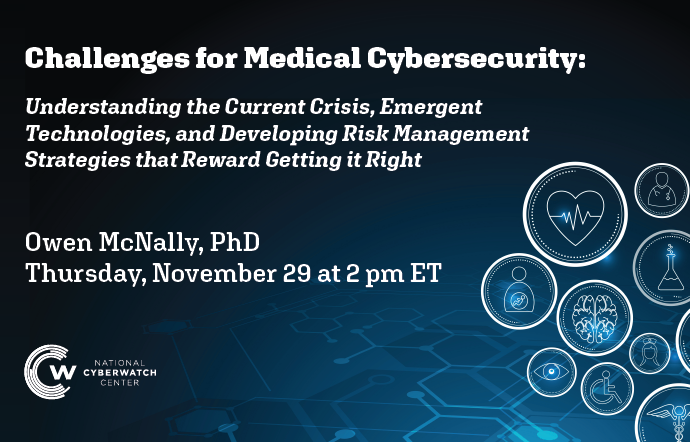
Challenges for Medical Cybersecurity: Understanding the Current Crisis, Emergent Technologies, and Developing Risk Management Strategies that Reward Getting it Right
There is abundant evidence that the cybersecurity situation for healthcare systems is deteriorating. Cycles of dynamic innovation by increasingly sophisticated bad actors appear all too often to be forcing security professionals to play catch-up. This webcast will explore a series of core metrics that represent the very problematic status quo:, including (1) a recent survey shows about 62% of healthcare executives admitted their organizations suffered a cyber attack in the past year (2) very high prices for exfiltrated personal health data on the dark web, (3) survey data indicates more than 60% of executives lacking confidence in the security of medical devices, (4) hospitals paying ransomware to organized crime organizations in order to keep access to critical patient records (5) for eight straight years, healthcare organizations lead all other sectors in costs of data breaches. Meanwhile, both cybersecurity professionals and their trainers are in short supply. The situation may be contributing to medical professionals reporting burnout. That’s the bad news: on the other hand, there are emerging technologies, on a continuum of maturation, that not only can make medical systems more secure, resilient, and robust but even support taking the fight to the enemy. In addition, the development of better actuarial models and price-points for cybersecurity insurance support enhanced risk management strategies, leading to the quantification of benefits for rectifying the current problems, and investing in improving the situation.
Dr. Owen McNally is a research analyst in Austin, Texas. A continuing theme in his work over recent decades is the analysis and evaluation of technology based on humanistic principles. After completing undergraduate studies in Psychology at the University of Dallas, he turned in the early 1990’s to study cognitive neuroscience, artificial intelligence, the pre-WWW Internet, and cyberpunk culture. After completing graduate work in psychology at Duquesne University, he joined a series of software development teams as a usability and quality assurance tester. He subsequently earned an interdisciplinary Ph.D. at the University of Texas at Austin, with a program of work in Medical Cognitive Science, and has taught college-level software design, cognitive studies, psychology, research methods, and statistics for the behavioral sciences. In recent years his work has been in the areas of research for investors in cybersecurity, neurotech, AI, logistics and hospital technology.
